
Twins Video
Early Days
Kaat was signed as an amateur free agent by the Washington Senators out of Hope College (Michigan) as an 18 year old. Kaat spent a few years in the minor leagues with the Washington Senators affiliates. Kaat bounced back-and-forth between the minors and majors in 1959 and 1960 before becoming a mainstay in the rotation in 1961. Kaat made 11 starts for the Washington Senators, going 1-7 with a 6.22 ERA. Kaat was not very effective with the Senators, walking 35 batters while only striking out 27 in the 55 innings he threw for Washington.
Kaat on the Prowl
With a rocky first couple of years, Kaat needed a change of scenery. When the Senators relocated to Minnesota in 1961 and became the Twins, Kaat was seen to be a big part of their future. In the Twins inaugural season, Kaat was a decent starter, going 9-16 but posted an ERA of 3.90 and threw 200 2/3 innings at the age of 22. He showed promise despite the team’s poor record of 70-90.
Longevity is King
Longevity is often downplayed in baseball today. Corbin Burnes won the NL Cy Young with only 167 innings in 2021. Burnes was so dominant that he still got the award, but I think one of the best qualities a pitcher can have is going deep into games. Kaat always went deep into games, giving his team a chance to win while limiting the workload other pitchers needed to throw. In MLB history, Kaat has the 25th most innings pitched (4,530). In Kaat’s career, he had 14 seasons in which he threw more than 200 innings.
From 1964 to 1971, Kaat was an absolute workhorse for the Twins. Over that eight year stretch, he threw 2,016 1/3 innings (over 250 per year on average). In that stretch, he was 131-97 with a 3.13 ERA and a 3.15 FIP. He also accumulated 38.3 fWAR in that stretch, or almost 5 WAR per season on average.
Kaat was not super dominant, only striking out 5.5 batters per 9 innings throughout his 15 years with the Twins. However, he understood how to get guys out and worked quickly, often being called the master of the quick pitch. Kaat was a very smart pitcher and got guys out by locating his pitches, changing speeds, and working extremely fast.
Prime Years
In 1964, Kaat hit his stride. After a 1963 season in which he regressed to a 4.19 ERA in only 178 innings, he bounced back and went 17-11 with a 3.22 ERA and threw 243 innings. It was clear that Kaat was going to be a very consistent pitcher for the Twins going forward, and a workhorse they could rely on to eat up innings.
The following year, 1965, Kaat was a crucial member of potentially the best pitching staff in Twins history. The 1965 Twins went 102-60 and posted a 3.14 ERA as a staff. Kaat went 18-11 with a 2.83 ERA, his first time posting a sub-3 ERA. He also threw 264 innings (2nd on team), only trailing Mudcat Grant. The 1965 team was the first team in Twins history to make it to the World Series. In the World Series, Kaat pitched game two and was excellent. He outdueled Sandy Koufax, pitching a complete game while allowing seven hits and only one run in a 5-1 Twins win. The Twins would end up losing the series in seven games but the team showed great promise.
Kaat’s best season was 1966. In 1966, Kaat started an astonishing 41 games, threw 304 2/3 innings, and went 25-13 with a 131 ERA+ (2.75 ERA). He led the American League in wins, games started, complete games (19), innings, and strikeout to walk ratio (3.73). He also led all American League pitchers in fWAR (6.4). Kaat finished fifth in MVP voting. At the time, there was only one Cy Young Award and Dodgers lefty Sandy Koufax won it. Had there been separate awards in the American and National League, Kaat was very likely to have won the AL version in 1966.
Defense Wins Championships
When people think of Jim Kaat, they usually think about his longevity as a pitcher or his ability to pitch deep into games. One thing Jim Kaat excelled at more than anything was defending his position. In Kaat’s career, he won 16 gold gloves. This is the second most for any player all-time, behind Greg Maddux.
After Twins
In the early 1970’s, the Twins were very mediocre. However, Kaat was not. After an outstanding 1972 season in which Kaat was 10-2 with a 2.06 ERA, he demanded that owner Calvin Griffith raise his salary to $60,000. Griffith unhappily obliged. In 1973, the Twins were once again mediocre so Griffith placed Kaat on waivers in early August and he was claimed by the Chicago White Sox.
For the rest of his career, Kaat spent time with the White Sox, Phillies, Yankees, and Cardinals, winning a World Series championship with the Cardinals in 1982. Kaat was recently elected to the Hall of Fame by the Golden Days Era Committee with former teammate Tony Oliva.
Conclusion
Jim Kaat is not only an all-time Twins great, but an all-time MLB great. He has the second highest WAR (53.8) out of all Twins pitchers, trailing only Bert Blyleven. He also threw the most innings in Twins history (2,959). He was a bulldog and fan favorite pitcher who is now rightfully enshrined in the Baseball Hall of Fame.
Kaat is also a Twins broadcaster and offers analysis during some Twins broadcasts throughout the year, and a player who played in four different decades in his career brings some unique insight to the broadcast.
Stay tuned for the fourth day of Twinsmas!
Thank you for reading, and Go Twins!
Read Previous "12 Days of TwinsMas" articles here:
#12 - Torii Hunter
#11 - Chuck Knoblauch
#10 - Jim Kaat
#9 - Coming tomorrow!
MORE FROM TWINS DAILY
— Latest Twins coverage from our writers
— Recent Twins discussion in our forums
— Follow Twins Daily via Twitter, Facebook or email
— Become a Twins Daily Caretaker
- Heiny, Karbo and nclahammer
-
 3
3







Recommended Comments
Join the conversation
You can post now and register later. If you have an account, sign in now to post with your account.
Note: Your post will require moderator approval before it will be visible.